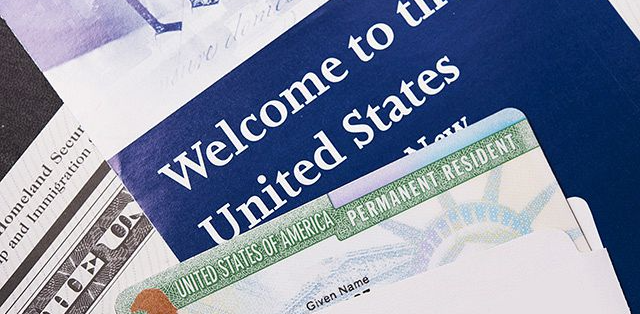Семья
Найдите ценную информацию и обновления о семейной иммиграции и о том, как граждане и постоянные жители могут спонсировать своих близких, чтобы иметь возможность легально жить и работать в США с визами, грин-картами и гражданством. Наши опытные специалисты по иммиграции делятся своим опытом по постоянно меняющейся иммиграционной политике и связанным с ней вопросам. Обязательно заходите почаще и подписывайтесь на получение актуальной информации!
Подписаться
Спасибо за подписку.
К сожалению, при отправке вашего сообщения произошла ошибка. Повторите попытку позже.

Автор: Denice Flores
•
4 апреля 2024 г.
Advance parole is a travel document that permits you to travel outside the United States for temporary travel and return to the United States . Applicants for advance parole need to file Form I-131, Application for Travel Document with U.S. Citizenship and Immigration Services (USCIS) and pay the filing fee. When the application is approved, USCIS issues the applicant a Form I-512L, the advance parole document. The document must be presented to immigration officials to seek admission into the United States after traveling abroad. There are several ways a person can qualify for and obtain advance parole. Applicants for adjustment of status, DACA recipients, and individuals who need to travel for urgent humanitarian reasons are three common types of applicants that can apply for advance parole , however there are more. Applicants for adjustment of status can apply for advance parole when they file their green card application or when the green card application is pending. Adjustment of status applicants must obtain advance parole before traveling outside the United States to avoid an issue with the green card application. Obtaining advance parole through an adjustment of status application does not require an emergency or humanitarian purpose for travel. Note, when you file for advance parole through an adjustment of status application the filing fee for Form I-131 is not required. DACA recipients may also apply for advance parole to travel abroad for humanitarian reasons or for employment or educational purposes only. Humanitarian reasons include medical attention or treatment, visiting a sick relative or for a relative’s funeral services. Educational purposes include studying abroad, academic research and more. Employment purposes include work, training, meetings, interviews, and other specific work assignments. Certain individuals may also apply for advance parole due to an urgent humanitarian reason or to further a significant public benefit. To show that the travel is due to humanitarian, education, or employment reasons, the applicant must provide proof of such to USCIS. As mentioned, these are the three most common ways to obtain advance parole, but they are not the only ways. If you have questions about other ways to obtain advance parole, if you think you qualify for advance parole or have questions about your eligibility, please schedule a consultation with one of our experienced attorneys and we will be more than happy to assist you.

Автор: Denice Flores
•
2 марта 2023 г.
Your conditional resident status is only valid for 2 years. In order to prevent losing lawful status in the United States, you must submit Form I-751, Petition to Remove Conditions on Residence, 90 days before your conditional green card expires. It is critical that you file Form I-751 to remove the conditions in a timely manner because if it is not, you may risk being left without status and the U.S. Department of Homeland Security may issue you a Notice to Appear and place you in removal proceedings before an Immigration Judge.

Автор: Angelica Rice
•
10 июня 2022 г.
Picture this : your significant other finally proposed to you and you are excited, not only for wedding planning but to star t your green card process! One thing to decide before you pop the champagne and start vetting wedding vendors, do I apply for a K1 visa and then start the green card process or do I start the marriage green card process right away? Most people aren’t sure how to answer this question. So when do you apply for a K1 visa versus simply starting the marriage green card process? Keep reading to find out.

Автор: Angelica Rice
•
29 января 2022 г.
Click here to read this article in Portuguese and Spanish If you and your spouse were married for less than 2 years at the time of your I-485 ( Adjustment of Status ) interview and your application was approved, your lawful permanent resident status is conditional and a separate petition to remove those conditions (I-751 petition) must be filed within 90 days of the expiration date on your Green Card. An I-751 petition is a joint petition, filed by the Green Card holder and their spouse, that requests USCIS remove the conditions and issue you permanent resident status and a new 10-year Green Card. However, what if after filing the I-751 petition, you and your spouse decide to get divorced? In such situations, the Green Card holder can request a waiver of the joint petition filing requirement and submit this request with their I-751 petition. Even if you are requesting an I-751 waiver, you must still show that the marriage was originally entered into in good faith. This means that you will still need to prove to USCIS that you entered into the marriage for love and not just to obtain a Green Card. Evidence of good faith can include, but is not limited to, the marriage certificate, joint documents, birth certificates of children born of the marriage, etc. Documentation that can/should be submitted with your I-751 waiver request include copy of your green card, documentation regarding the circumstances surrounding the end of your marriage, evidence that the marriage was entered into in good faith, copy of the divorce decree (or evidence that divorce proceedings have been initiated if not yet final), statement from you regarding the circumstances, etc. USCIS reviews waiver requests on a case-by-case basis. Current USCIS policy guidance indicates that if a waiver request is made and the divorce is not yet final, USCIS should issue a Request for Evidence (RFE) with a response period of up to 87 days. In the RFE, the officer will request that you provide a copy of the final divorce decree and a statement from you officially asking that the I-751 petition be converted to a waiver application (if not already provided), along with any other documents they deem necessary to decide the case. As long as you can provide these documents to USCIS by the response deadline, the officer can amend the I-751 petition indicating that you are eligible for a waiver based on the termination of the marriage and can adjudicate the petition as such without the need to re-file the application. USCIS will then evaluate whether or not the good faith requirement has been met and may schedule the case for an in-person interview. If the application is approved, then you will be issued your 10-year Green Card. If the application is denied, then your case may be referred to immigration court and you may be placed in removal proceedings. I-751 waiver cases are a complicated matter. If you or someone you know find themselves in a situation like the one mentioned above, please contact our experienced immigration attorneys at Santos Lloyd Law Firm for assistance with your case.

Автор: April Perez
•
13 сентября 2021 г.
But what should you expect at the interview?
In some ways this may feel almost like a job interview, but it isn’t. The purpose of the interview is to verify that you and your spouse have filed a petition based on a bona fide or real marriage. The difference between this and a job interview is that at this interview you and your spouse will be sworn in and anything you answer will be considered testimony. The officer will verify your information on the I-130 Petition for Alien Relative and the I-485 Applicant to Register Permanent Residence updating any information such as address or employer. The officer will also ask questions about your relationship, something that may seem odd to U.S. born citizens.

Автор: April Perez
•
23 августа 2021 г.
It is a petition that can be filed by a Lawful Permanent Resident or U.S. Citizen Spouse on behalf of their immigrant spouse to obtain a green card. In order to file the petition, the individuals must be legally married, no specific period of time is required, but the length of the marriage at the time of the interview may affect if a 2 year or 10-year green card is issued if the case is approved.

Автор: Natalia Hynes
•
10 июля 2021 г.
Under the current American Immigration System, there are three major paths to becoming a Lawful Permanent Resident, popularly known as a " Green Card Holder ." One is: Family Ties . This means that a qualifying family member, such as a spouse, parent or child, sponsors your application. A second path is: Employment Ties. Meaning that your employer sponsors your application. And third is: Humanitarian Reasons. This is the least common of the three paths, and involves getting residence through a humanitarian immigration program, such as asylum or refugee status. This article explores the first path, obtaining a green card based through marriage, and is the story of my personal experience, getting my green card through marriage to my husband.
Самые последние сообщения

Автор: Juliana LaMendola
•
20 февраля 2025 г.
On January 20, 2025, President Donald Trump signed an Executive Order imposing new restrictions on migrants, including limitations on asylum and humanitarian protections. The order directs the Department of Homeland Security (DHS) to terminate all categorical parole programs that conflict with U.S. policies , which includes parole processes for Cuban, Haitian, Nicaraguan, and Venezuelan nationals. Additionally, this provision could impact parole programs for individuals from Afghanistan, Ukraine, and other countries. Beyond restricting parole, the executive order introduces several border security measures , including building more physical barriers, increasing the number of border personnel, and stopping the use of the CBP One mobile application . The order specifically directs the Department of Defense (DOD) and DHS to build more border walls to establish what it calls “complete operational control” of the southern border. Additionally, it ordered the immediate shutdown of the CBP One mobile app, which previously allowed asylum seekers to schedule appointments at U.S. Ports of Entry. As a result, all existing appointments have been canceled immediately . The order also initiates the reinstatement of the “Remain in Mexico” program , also known as the Migrant Protection Protocols (MPP) , across all sectors of the southern border. Under MPP, asylum seekers must remain in Mexico while awaiting the outcome of their U.S. immigration court proceedings, significantly altering the process for those seeking refuge in the country. These measures reinforce the Trump administration's broader effort to restrict asylum and humanitarian protections at the U.S. border . If you or someone you know may be affected by this executive order, it is essential to stay informed and understand your legal rights. Consulting with an immigration attorney can help navigate these evolving policies and ensure the best course of action moving forward.

Автор: Shirin Navabi
•
13 февраля 2025 г.
The E-2 Visa is a non-immigrant visa that allows foreign investors from treaty countries to live and work in the United States by starting or purchasing a business. Unlike other visa categories, it does not require a fixed minimum investment amount. Instead, applicants must demonstrate that their investment is substantial and sufficient to ensure the success of their business. The visa is renewable indefinitely as long as the business remains active and meets the necessary criteria, making it an attractive option for entrepreneurs seeking long-term opportunities in the U.S. One of its key advantages is flexibility. Investors can establish a new business, acquire an existing one, or enter into franchise opportunities. Additionally, spouses and children under 21 can accompany the primary applicant, with spouses eligible to apply for work authorization. This makes the E-2 Visa a practical option for business-minded individuals looking to establish themselves in the U.S. market. While the E-2 Visa itself has remained a stable option, shifts in U.S. immigration policies have influenced the application process and overall investor experience. Understanding these changes is essential for anyone considering this pathway. Policy Shifts and the E-2 Visa: Lessons from the Past During the first Trump administration (2017–2021), U.S. immigration policies became more restrictive across multiple visa categories. Although the E-2 program was not directly limited, broader changes had an impact. The "Buy American, Hire American" Executive Order, signed in 2017, led to heightened scrutiny of visa applications, requiring investors to provide stronger evidence that their business would create jobs and contribute to the U.S. economy. This resulted in an increase in Requests for Evidence (RFEs) and denials for those unable to meet these expectations. Another significant change was the suspension of the Interview Waiver Program, which meant all E-2 applicants, including renewals, had to attend in-person interviews at U.S. embassies. This extended processing times and increased scrutiny of applications. Additionally, visa reciprocity agreements were reviewed and adjusted, impacting validity periods and costs for certain countries. For instance, Iranian citizens were deemed ineligible for the E-2 Visa due to the termination of the treaty. These adjustments significantly affected investors from impacted nations, increasing their costs and renewal frequency. Despite these policy shifts, the approval rate for E-2 visas remained relatively stable. According to data from the U.S. Department of State, there were over 43,000 approvals in 2019, reflecting the program’s continued viability. Even in 2020, when the COVID-19 pandemic caused global disruptions, approval numbers remained significant. These figures highlight that while the process became more rigorous, well-prepared investors continued to secure visas by demonstrating strong business plans, substantial investments, and clear economic contributions. What to Expect Moving Forward As the new Trump administration takes shape, further immigration policy changes are likely. While it is too soon to predict the exact impact on the E-2 Visa, past trends suggest increased scrutiny. However, the program itself has remained intact across multiple administrations, reinforcing its reliability for foreign entrepreneurs. Those considering this visa should stay informed and ensure their applications meet evolving requirements. A well-prepared investment strategy, clear documentation, and a defined job creation plan can make a significant difference in navigating any potential policy shifts. Why the E-2 Visa Remains a Strong Choice The E-2 Visa continues to be a resilient and valuable option for foreign entrepreneurs. Even during periods of policy change, approval rates have remained strong for investors with well-structured applications. The ability to renew indefinitely, combined with its flexibility in investment size and business type, makes it one of the most attractive pathways for international investors. With the right preparation, investors can confidently pursue the E-2 Visa, knowing that history has shown its stability even amid shifting political landscapes. By staying ahead of policy changes and ensuring a solid business strategy, entrepreneurs can take advantage of the opportunities the U.S. market has to offer. If you are ready to take the next step toward launching your business in the U.S., you can contact our office for expert guidance and personalized assistance with your application.

Автор: Kris Quadros-Ragar
•
6 февраля 2025 г.
On January 29, 2025, President Trump signed the Laken Riley Act into law, significantly altering how immigration policies are enforced in the United States. This legislation grants State attorneys general and other authorized officials unprecedented authority to interpret and implement federal immigration policies. It also empowers them to take legal action against the federal government if they believe federal immigration enforcement negatively impacts their state. With this new authority, states now play a direct role in shaping immigration outcomes—a responsibility traditionally held by the federal government. One of the most immediate effects of the Laken Riley Act is that it allows states to seek injunctive relief to block the issuance of visas to nationals of countries that refuse or unreasonably delay the acceptance of their citizens who have been ordered removed from the United States . This means that if a country does not cooperate with U.S. deportation efforts, its nationals—regardless of their legal status—could face significant difficulties obtaining or renewing visas. As a result, foreign nationals from these countries may encounter increased uncertainty when traveling internationally or securing work authorization in the U.S. Beyond visa processing, the law introduces a new level of unpredictability into the immigration system. By allowing state attorneys general to intervene in federal procedures, and immigration policies that may now vary based on state-level decisions. In the coming months, it remains to be seen how individual states will wield this power—whether they will actively seek to block visa issuance or push for broader immigration enforcement measures. For foreign nationals and employers, staying informed about which countries are deemed “uncooperative” is now more important than ever. Those needing visa renewals or planning international travel should prepare for potential delays and seek professional guidance to navigate these uncertainties. The Laken Riley Act also mandates federal immigration authorities to detain and deport individuals without legal status who are charged with certain offenses, including minor theft or shoplifting, assaulting a law enforcement officer, and crimes resulting in death or serious bodily injury. This provision underscores a stricter approach to immigration enforcement, affecting individuals accused of both minor and serious offenses. With immigration policies now subject to a new layer of state involvement, it is more important than ever to stay informed and prepared for potential challenges. If you have concerns about how the Laken Riley Act may affect your immigration status or business, contact Santos Lloyd Law Firm for strategic counsel tailored to your needs.
Юридическая фирма Сантос Ллойд, ПК Электронная почта: info@santoslloydlaw.com Телефон: (949) 316-0078 Факс: (949) 271-4500 Посещение офиса только по предварительной записи: 4340 Von Karman Ave, # 110 Newport Beach, CA 92660 Телефон: ( 949) 316-0078




